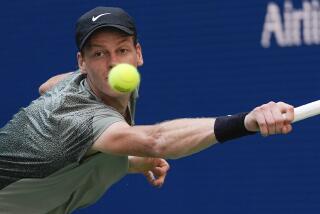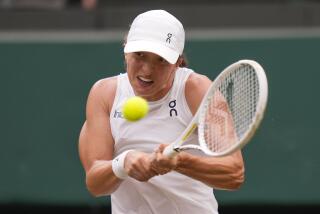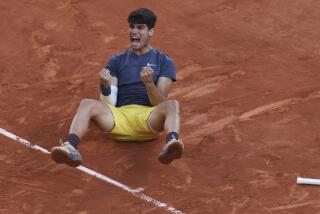Ferrero’s Win No Fake
PARIS — Usually, if a tennis player thinks his opponent is faking an injury, it is mentioned subtly or with a bit of sarcastic understatement.
Not at the French Open. Frenchman Nicolas Coutelot turned the previously nondescript Juan Carlos Ferrero into a figure of controversy, or at least tried to, declaring Thursday that the Spaniard was really not injured. The 11th-seeded Ferrero defeated Coutelot, 6-2, 5-7, 1-6, 6-2, 6-0, in 2 hours 53 minutes.
Coutelot blamed nearly everyone for his second-round loss to Ferrero, including the media and French radio in particular (“they’re crazy on radio”), and even managed to bring Osama bin Laden into the discussion.
“Of course, I knew about this supposed injury,” Coutelot said. “Just look at the way he played today. I’m very disappointed by the press. I don’t understand that the press talks about things they don’t know about. I don’t understand how it’s possible to say positively things that aren’t true.
“Well now I’m angry and I say to those who made this stupid thing, it was a lie. It’s like you said Bin Laden was dead, it’s not true. We saw today he’s not injured.”
There was one problem with this stream of random comments. Ferrero, twice a semifinalist here, really was injured, having hurt his right ankle the previous day, and would have had to possess the skills of a master thespian. A group of Spanish journalists saw him tumble in the final minutes of his practice against Tommy Robredo.
An amused Ferrero took the high road. “Oh great, I got injured and everything is going in my favor, everyone is going to be [tight] against me,” he said, laughing, to Spanish reporters.
Even though medical examinations showed no ligament damage, Ferrero thought his French Open run was over Wednesday night.
“Because in the night, I couldn’t walk,” he said. “So I thought today was impossible to play this match. Finally, with the help of a doctor, I could play. So much injections.”
His fitness was a big story here because of his clay-court stature. Ferrero won the first major clay-court tournament of the season last month at Monte Carlo and had been considered a stronger challenger because three-time winner Gustavo Kuerten had hip surgery in the winter.
Two other challengers looked vulnerable but finished strong in their second-round matches. Second-seeded Marat Safin of Russia was pushed to the limit by diminutive Belgian Olivier Rochus, winning, 4-6, 6-2, 3-6, 6-3, 6-3, and No. 4 Andre Agassi advanced when David Sanchez of Spain retired because of a blister on his left foot, with Agassi leading, 4-6, 6-2, 6-1.
“I felt like I was getting better as the match was going on,” Agassi said. “That’s always a great sign for me.”
Agassi, who is playing in his 14th French Open, was reflective and talked about how his life has changed since he won this title in 1999. He was asked if, at 16, he could have envisioned playing until 32.
“I mean, it’s hard to think past your evening date that night,” Agassi joked of being 16. “It’s hard. Look how my life has changed in three years. How do you ever predict what’s in store for you, for better or worse? To look at something 16 years later, it’s an absolute impossibility.
“If you had me take a guess then, I would have said I couldn’t have, I wouldn’t have, and I wouldn’t have wanted to [play] when I was 32 years old.”
Agassi was joined in the third round by fellow American Vince Spadea, who, playing on an outside court, survived two match points against Adrian Voinea of Romania in a 3-hour 40-minute marathon, winning, 6-4, 4-6, 2-6, 7-6 (4), 8-6. The final set lasted 54 minutes.
Another American, James Blake, almost pushed his match to a fifth set but fell short against Frenchman Sebastien Grosjean on the main show court, Court Philippe Chatrier.
Blake, in his French Open debut, rallied from a 5-1deficit in the fourth set, fought off a match point and tied it, 5-5, before the 10th-seeded Frenchman prevailed, 6-4, 3-6, 6-2, 7-5.
“It was great,” Blake said of the setting. “I actually expected [the fans] to be much harsher than they were. They were cheering when there was good tennis for me. There were obviously a few ‘Allez Sebs’ going on all the time. But I enjoy playing in front of a biased crowd.”
Grosjean eliminated Agassi last year, turning the match around when President Clinton arrived at Philippe Chatrier.
Next for Grosjean is Spadea, who is this year’s Slam revival story, coming back from the depths of the challenger circuit. He was ranked as high as No. 19 in the world in September 1999.
The lowest point was in September 2001, when he dropped to No. 240.
“I was in the top 20,” Spadea said, snapping his fingers. “Before I realized it ... I was in Las Vegas at a challenger and I hadn’t looked at [the ranking] and it was 240. Whoa! That was my type of rock-bottom situation. It wasn’t a good feeling.”
*
(BEGIN TEXT OF INFOBOX)
Day 4 Highlights
Men’s seeded losers: No. 6 Tim Henman, No. 19 Thomas Enqvist, No. 23 Fabrice Santoro.
Men’s seeded winners: No. 3 Tommy Haas, No. 4 Andre Agassi, No. 10 Sebastien Grosjean, No. 11 Juan Carlos Ferrero, No. 14 Jiri Novak, No. 25 Tommy Robredo, No. 29 David Nalbandian, No. 31 Gaston Gaudio.
Women’s seeded losers: No. 16 Barbara Schett, No. 26 Ai Sugiyama, No. 32 Cristina Torrens Valero.
Women’s seeded winners: No. 1 Jennifer Capriati, No. 3 Serena Williams, No. 7 Jelena Dokic, No. 9 Silvia Farina Elia, No. 14 Iroda Tulyaganova, No. 17 Tamarine Tanasugarn, No. 20 Patty Schnyder.
Featured matches: No. 1 Lleyton Hewitt vs. Sjeng Schalken, No. 2 Venus Williams vs. No. 31 Rita Grande, No. 15 Guillermo Canas vs. No. 17 Carlos Moya.
Stat of the day: 14 breaks of service in Capriati’s 6-4, 6-3 victory over Amy Frazier, including 11 in a row.
More to Read
Go beyond the scoreboard
Get the latest on L.A.'s teams in the daily Sports Report newsletter.
You may occasionally receive promotional content from the Los Angeles Times.











